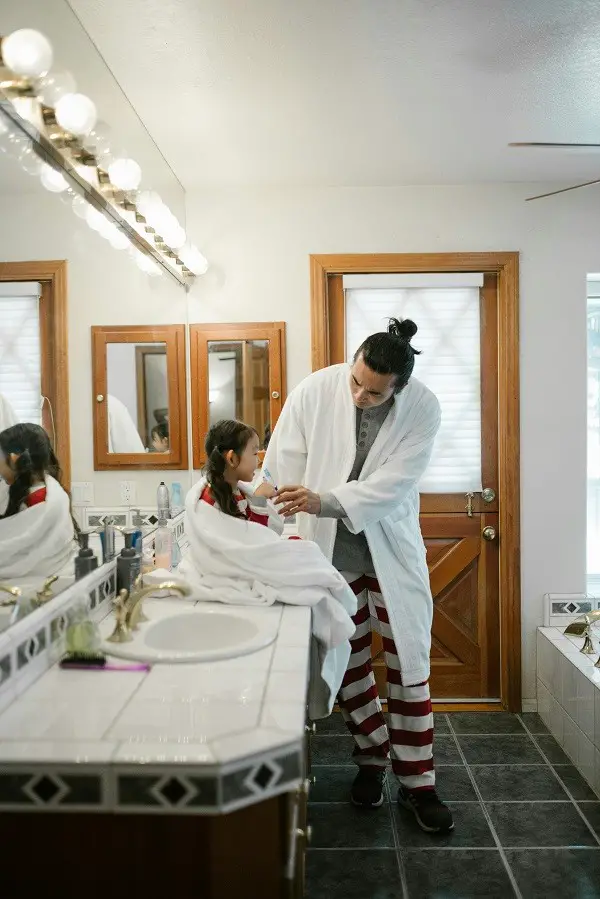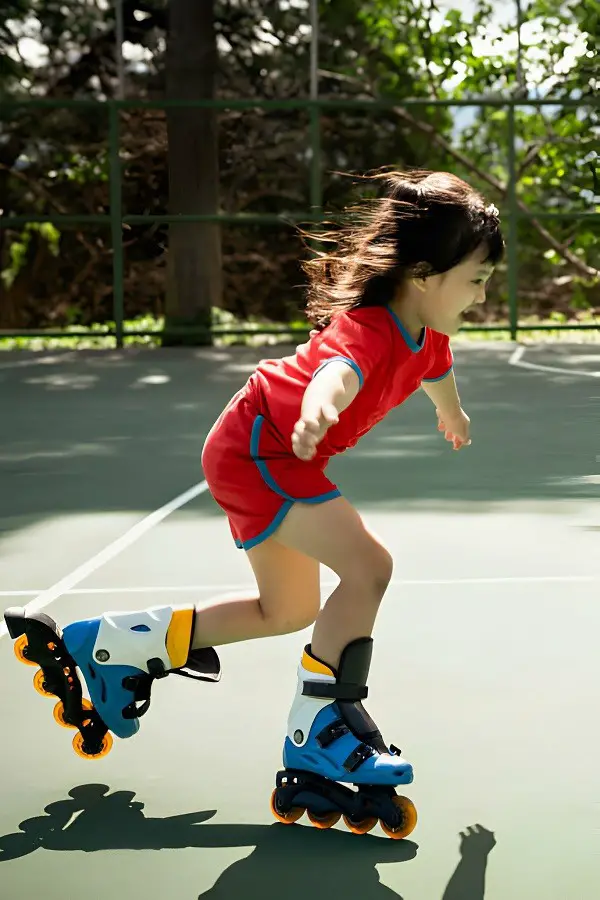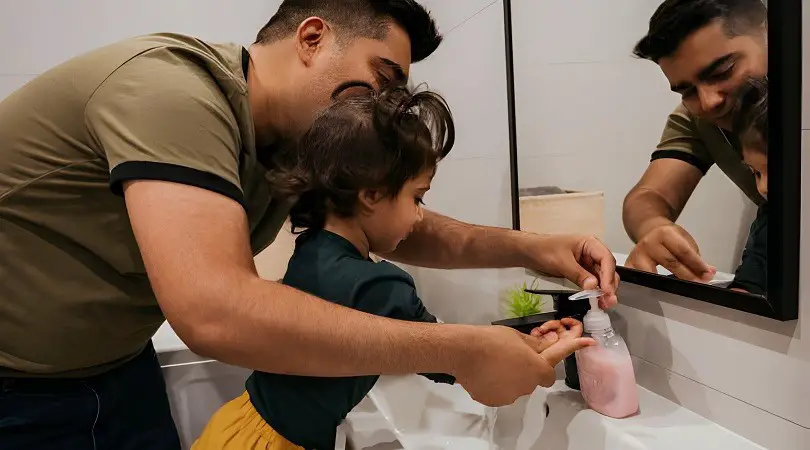Last Updated on January 6, 2025
Teach kids personal hygiene for lifelong health. Instill habits that promote cleanliness and well-being early on.
Maintaining good personal hygiene is crucial for overall health and well-being. Teaching kids healthy habits such as washing hands frequently, brushing teeth regularly, and showering daily can help prevent illnesses and promote good hygiene practices. By instilling these habits at a young age, children can develop a strong foundation for maintaining personal hygiene throughout their lives.
We will explore the importance of teaching kids the significance of personal hygiene and provide practical tips on how to make it a fun and engaging learning experience. Let’s delve into ways to promote cleanliness and healthy habits in children to ensure a lifetime of well-being and good health.

The Basics Of Personal Hygiene
Teaching kids the importance of personal hygiene instills healthy habits. Encouraging regular handwashing, dental care, and body cleanliness promotes overall well-being. Educating children early on about personal hygiene sets the foundation for a lifetime of good health practices.
Teaching kids About Daily Practices
Teaching kids the essentials of personal hygiene starts with daily practices. Encourage them to maintain cleanliness in a fun and engaging manner.
Importance of Regular Handwashing
Emphasize the significance of regular handwashing to prevent the spread of germs and illnesses. Teach kids the proper technique and the right times to wash their hands.
Healthy Habits For Dental Care
Teaching kids about the importance of personal hygiene, particularly in dental care, sets the foundation for a lifetime of healthy habits. By instilling these practices early on, parents and caregivers empower children to take charge of their oral health. The following healthy dental habits are crucial for kids to practice to maintain a healthy smile.
Brushing Teeth Twice A Day
Encourage your children to brush their teeth twice a day, once in the morning and once before bed. Using fluoride toothpaste and a soft-bristled toothbrush, teach them the proper technique of brushing with small circular motions to clean all surfaces of the teeth and gums.
Flossing And Regular Dental Check-ups
In addition to brushing, flossing is a daily habit to remove food particles and plaque from between teeth. Regular dental check-ups are essential for preventive care, ensuring early detection of any issues. Schedule visits every six months for professional cleaning and examination.
Promoting Skin And Hair Health
Teaching kids about the importance of personal hygiene is a crucial and valuable life lesson. One aspect of personal hygiene is taking care of our skin and hair. By incorporating cleansing and moisturizing routines, as well as learning proper hair-washing techniques, children can develop healthy habits that will benefit them in the long run. Let’s delve into these practices:
Cleansing And Moisturizing Routines
Properly cleansing and moisturizing the skin is essential for maintaining its health and vitality. Children should be taught to wash their face and body gently with mild soap and warm water, ensuring they clean away dirt, bacteria, and excess oils that can lead to skin issues. Encourage them to use a clean, soft towel to pat their skin dry, avoiding harsh rubbing that can cause irritation or damage.
Once the skin is cleansed, it’s important to follow up with a moisturizer suitable for their specific skin type. Moisturizers help keep the skin hydrated, prevent dryness, and maintain its natural moisture barrier. Explain to children the importance of applying moisturizer to their face and body, making sure to massage it in gently until fully absorbed.
Hair Washing Techniques
Keeping the hair clean is crucial for maintaining scalp health and preventing issues like dandruff and grease buildup. Teach children the importance of frequent hair washing using a gentle shampoo. Demonstrate proper techniques such as wetting the hair thoroughly, applying an appropriate amount of shampoo, and massaging the scalp in circular motions to evenly distribute the product.
Emphasize the significance of rinsing the hair thoroughly to remove all shampoo residue, preventing product buildup that can weigh the hair down. Encourage them to use conditioner after shampooing, reminding them to apply it mainly to the ends of their hair and to rinse it out thoroughly as well.
Nutrition And Personal Hygiene
When it comes to personal hygiene, good nutrition plays a vital role in maintaining healthy habits. Teaching kids the importance of personal hygiene goes beyond just keeping themselves clean. It also includes understanding how their diet impacts their overall hygiene habits. Nutrition plays a crucial role in not only their physical health but also in maintaining healthy skin and teeth.
Impact Of Diet On Hygiene Habits
A balanced and nutritious diet is essential for promoting good hygiene habits in children. The food they consume directly affects their overall health and well-being, including their skin and teeth. A diet lacking in essential nutrients can lead to various hygiene issues, such as skin problems and dental decay.
Balanced Diet For Healthy Skin And Teeth
A well-balanced diet consisting of fruits, vegetables, whole grains, lean proteins, and healthy fats is key to maintaining healthy skin and teeth. These food groups provide essential vitamins, minerals, and antioxidants that strengthen the immune system and promote good oral health. Including foods rich in Vitamin C, like oranges and strawberries, can help in the production of collagen, which keeps the skin healthy and youthful.
Eating foods high in Vitamin A, such as carrots and spinach, helps in maintaining healthy skin and prevents dryness. Additionally, consuming calcium-rich foods like milk, yogurt, and cheese, as well as fluoride from sources like water and toothpaste, strengthens tooth enamel and protects against cavities.
Avoiding excessive consumption of sugary snacks and drinks is crucial for preventing dental decay. Encouraging kids to drink plenty of water and limit their intake of sugary treats can significantly improve their oral hygiene habits. Consistent brushing and flossing, combined with a balanced diet, will support their overall dental health.
Teaching children about the importance of nutrition and how it affects their hygiene is a valuable lesson. By promoting a balanced diet and providing them with this knowledge, we can help them develop good hygiene habits that will last a lifetime.

Incorporating Fun Into Hygiene Practices
Creative Ways To Teach Hygiene
Introducing personal hygiene to kids can be met with resistance, but with the right approach, it can be made enjoyable and even fun. By incorporating creative and engaging activities into their daily routines, children can be taught the importance of taking care of their hygiene.
Making Hygiene Routine Enjoyable For Kids
It’s important to find ways to make hygiene routines enjoyable for kids so that they are more likely to embrace good hygiene habits. Fun and interactive methods can be utilized to instill these habits, creating a positive association with personal care.
Frequently Asked Questions
What Are Some Simple Healthy Habits For Kids?
Some simple healthy habits for kids include washing hands regularly, brushing teeth twice a day, and taking a bath daily.
Why Is Personal Hygiene Important In Childhood?
Personal hygiene is important in childhood as it helps prevent the spread of germs, promotes good health, and instills lifelong cleanliness habits.
How Can I Teach My Child The Importance Of Personal Hygiene?
You can teach your child the importance of personal hygiene by being a role model, explaining the benefits, making it fun, and praising their efforts.
What Are The Consequences Of Poor Personal Hygiene In Children?
Poor personal hygiene in children can lead to illnesses, increased risk of infections, social isolation, and physical discomfort or unpleasant odors.
At What Age Should I Start Teaching My Child About Personal Hygiene?
It’s never too early to start! You can introduce basic personal hygiene habits like handwashing as soon as your child can understand and follow simple instructions.
Conclusion
Incorporating healthy hygiene habits in children can contribute to their overall well-being and confidence. By teaching them the importance of personal care and grooming, we equip them with essential life skills. Encouraging these habits at an early age will help them develop into responsible and self-sufficient individuals.
Understanding the significance of personal hygiene ensures a better quality of life for our children.








